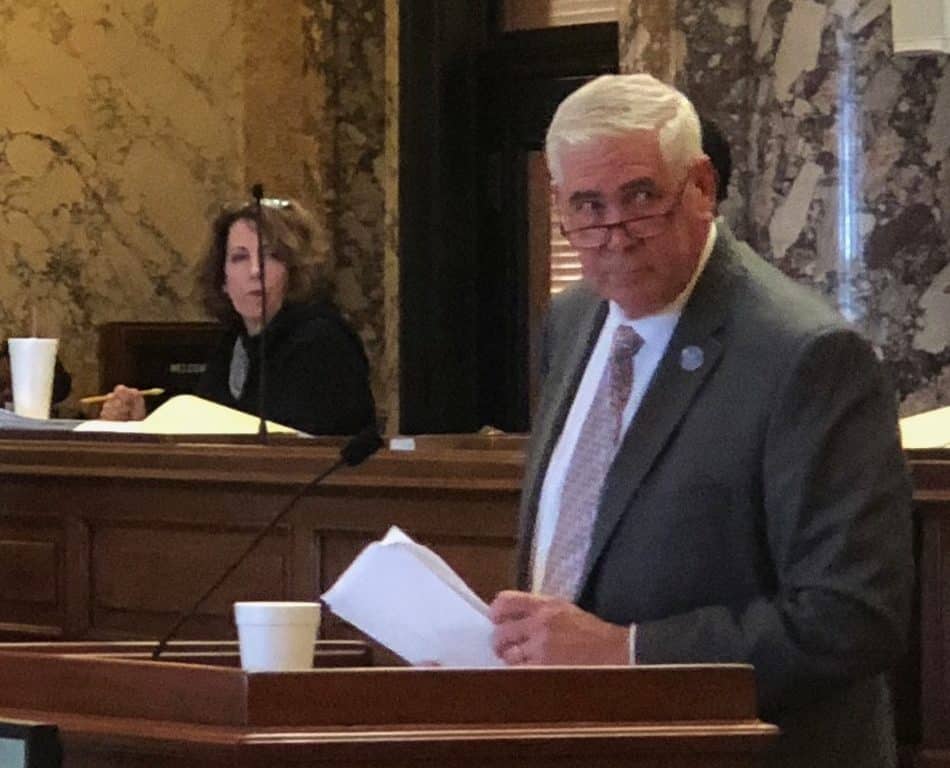Mississippi Today
Medicaid expansion bill inches forward in Senate with few details

Senate Republican leaders continue to keep any particulars of their Medicaid expansion plans close to the vest, with a committee passing only a shell of a bill Tuesday to meet a deadline and keep it alive.
Meanwhile, a Medicaid expansion bill the House passed last week sits untouched in the Senate, and the two Republican-led chambers do not appear to be in sync on the issue.
Senate leaders have said they are dead set on any expansion of Medicaid coverage including a work requirement for recipients. This would require federal approval, which many say is unlikely. The House version includes a work requirement, but says the program would still be expanded even if the feds don't approve a work requirement.
“If no work requirements, no expansion,” Senate Medicaid Chairman Kevin Blackwell, R-Southaven, said about the bill he calls “expansion light.”
Senate Bill 2735, authored by Blackwell, remains only a skeleton bill bringing forth the code sections necessary to expand Medicaid, with details to be hashed out later.
On Tuesday, Blackwell spent 25 seconds explaining the bill to committee members and 15 seconds counting a committee vote. Rita Potts Parks, R-Corinth, was the only No vote.
No questions were asked in committee.
Blackwell said the Senate measure, like the House plan, likely would raise the income eligibility for Medicaid coverage to 138% of the federal poverty level, up to about $20,000 annually for an individual. He said the plan would likely require Medicaid expansion recipients to pay premiums on a sliding scale based on income.
READ MORE: ‘Moral imperative': House overwhelmingly passes Mississippi Medicaid expansion
Mississippi is one of 10 states that has not expanded Medicaid to cover the working poor with the federal government picking up at least 90% of the cost. For the last decade, most Republican leaders, including now Gov. Tate Reeves, have decried expansion as “Obamacare” and “welfare” and the issue has not even garnered serious discussion or hearings in recent years.
But polls have shown growing support for expansion — even among Republicans — as Mississippi's hospitals founder from providing free care to the uninsured and the state continues to have health statistics and outcomes that rival Third World areas.
New Republican House Speaker Jason White supports expansion, and second-term Lt. Gov. Delbert Hosemann has said he's open to it and wants to help create a healthier workforce in Mississippi.
A prerequisite that Mississippi's plan have a work requirement could kill its expansion. During the Biden administration, federal Centers for Medicaid Services has rescinded work requirements previously approved for other states during the Trump administration and has not approved new ones. Georgia remains in litigation with federal government over the work requirement issue.
Blackwell and other Senate Republicans realize the realpolitik of getting a work requirement approved, and say implementing expansion could perhaps be pushed back until after this year's presidential election, so a new administration might approve a work requirement.
While both House and Senate leaders say they support a work requirement, the one in House Bill 1725 – which overwhelmingly passed the House – is only a “best-case scenario.” The bill has a provision that if federal authorities do not approve the waiver necessary to allow a Mississippi work requirement is not granted by Sept. 30, 2024, Medicaid would still be fully expanded to people up to 138% of the federal poverty level, starting in January 2025.
Blackwell said he doesn't believe an expansion bill could garner the votes it needs from the Senate without the work requirement.
“Their [House] bill has a component, the first section, for the working people,” Blackwell said. “But if CMS comes back and says they're not going to accept that, it's traditional expansion. And we're not going to get that passed over on this side.”
Senator Chad McMahan, R-Guntown, a member of the Medicaid committee, said he is in favor of expansion — both because he knows his constituents support it, and also because of his personal experiences growing up in a low-income, working-class family.
“I came from a family that didn't have health insurance for a number of years,” McMahan said, “and I saw the fear in my mom and dad's face when I got hurt and they had to decide about paying a car note, paying a house note or paying medical bills. And that's why I'm sympathetic to the legislation. Working people in this state need a safety net, they need a way to access some basic medical care.”
But he said he would have a hard time supporting an expansion bill that had no work requirement.
“There's a difference between just giving handouts and giving people a hand up to help them,” McMahan said. “I want to provide the working people of this state an opportunity to have some type of health care if their employer doesn't provide that.”
Blackwell said the Senate bill could perhaps contain language and dates to allow a new presidential administration to take office — and approve a work waiver — before expansion would start.
“I'd love for there to be a change and I think the rest of the country would love for there to be a change,” he said. “We'll just have to see whatever timeframes we put in are going to try to accommodate that potential change.”
McMahan said, “I think the work requirement is a big piece of it for Republicans. It's got to be a helping hand. We have the lowest work participation rate in the United States. And if we can figure out a way to help people go to work and provide some health care, I'm for that.”
This article first appeared on Mississippi Today and is republished here under a Creative Commons license.
Mississippi Today
On this day in 1892
MAY 21, 1892

Crusading journalist Ida B. Wells published a column exposing the lynchings of African-American men and denouncing claims that the lynchings were meant to protect white women.
Her anti-lynching campaign came after a mob killed three of her friends, who had reportedly opened a grocery store that competed with a white-owned store in Memphis.
Upset by Wells' writings, a white mob destroyed her presses and threatened to kill her if she ever published again. She left Memphis for Chicago, but she continued to expose lynchings, calling for national legislation to make lynching a crime.
In 1898, she took her protest to the White House.
“Nowhere in the civilized world save the United States of America do men, possessing all civil and political power, go out in bands of 50 and 5,000 to hunt down, shoot, hang or burn to death a single individual, unarmed and absolutely powerless,” she wrote. “We refuse to believe this country, so powerful to defend its citizens abroad, is unable to protect its citizens at home.”
The National Memorial for Peace and Justice in Montgomery, which opened in 2018, features a reflection space in honor of her.
Congress finally passed an anti-lyncing law in the 2021-22 session. The Emmett Till Antilynching Act defines lynching as a federal hate crime.
This article first appeared on Mississippi Today and is republished here under a Creative Commons license.
Mississippi Today
On this day in 1961
MAY 20, 1961

A white mob of more than 300, including Klansmen, attacked Freedom Riders at the Greyhound Bus Station in Montgomery, Alabama. Future Congressman John Lewis was among them.
“An angry mob came out of nowhere, hundreds of people, with bricks and balls, chains,” Lewis recalled.
After beating on the riders, the mob turned on reporters and then Justice Department official John Seigenthaler, who was beaten unconscious and left in the street after helping two riders.
“Then they turned on my colleagues and started beating us and beat us so severely, we were left bloodied and unconscious in the streets of Montgomery,” Lewis recalled.
As the mob headed his way, Freedom Rider James Zwerg said he asked for God to be with him, and “I felt absolutely surrounded by love. I knew that whether I lived or died, I was going to be OK.”
The mob beat him so badly that his suit was soaked in blood.
“There was nothing particularly heroic in what I did,” he said. “If you want to talk about heroism, consider the Black man who probably saved my life. This man in coveralls, just off of work, happened to walk by as my beating was going on and said ‘Stop beating that kid. If you want to beat someone, beat me.' And they did. He was still unconscious when I left the hospital.”
To quell the violence, Attorney General Robert Kennedy sent in 450 federal marshals.
This article first appeared on Mississippi Today and is republished here under a Creative Commons license.
Mississippi Today
Podcast: The controversial day that Robert Kennedy came to the University of Mississippi
Retired U.S. Bankruptcy Judge Edward Ellington talks with Mississippi Today's Bobby Harrison and Geoff Pender about former U.S. Attorney General Robert Kennedy's speech at the University of Mississippi less than four years after the riots that occurred after the integration of the school. Ellington, who at the time headed the Ole Miss Speaker's Bureau as a law school student, recalls the controversy leading up to the speech.
This article first appeared on Mississippi Today and is republished here under a Creative Commons license.
-
Our Mississippi Home7 days ago
Beat the Heat with Mississippi’s Best Waterparks
-
SuperTalk FM4 days ago
State auditor cracking down on Mississippians receiving unemployment benefits
-
Mississippi News Video6 days ago
Jackson has a gang problem
-
Kaiser Health News7 days ago
Medicaid ‘Unwinding’ Decried as Biased Against Disabled People
-
Local News3 days ago
Family files lawsuit after teen’s suicide in Harrison County Jail
-
Mississippi Today5 days ago
On this day in 1950
-
228Sports6 days ago
George County Pours Runs In 6A South State Title Victory At PRC
-
Local News Video6 days ago
In the Kitchen with J's Restaurant








































